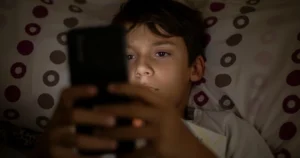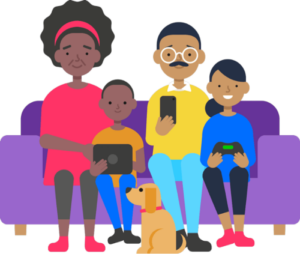Experts Dr Elizabeth Milovidov, John Carr and Alan Mackenzie discuss how to create a kinder world online. See what you can do to promote positivity and kindness in your child’s online actions.
If you wouldn’t say it in person, don’t post it online
We can all remember a time when a wise grandparent, relative or respected community elder cautiously shared a variation on the theme “If you don’t have anything nice to say, don’t say anything at all.” That same bit of wisdom can serve us all – children, young people and adults alike – in the digital space. As we expand from online gaming chats, social networks and virtual concerts to a full-fledged metaverse of online exchanges, kindness is an essential part of being responsible online just as it is essential offline.
Constructive criticism and well-meaning comments can be heartfelt and sincere, but the difference in the digital space is that we can’t judge someone’s facial expression or mood when they write the comment. And when we add ‘unkind’ comments into the equation, it is even more difficult for children and young people to know how to respond.
What can parents and carers do to help children and young people express kindness in online communities?
Remind your child or young person about the online disinhibition effect. Just because you think you are anonymous online, does not mean that you should say anything that pops into your head.
Remember that behind every avatar, chat name or email, there is a real person who may be having a bad day. And whether they say something unkind to you or they are the recipient of your unkind comment, being unkind online can cause harm in the real world.
Find your teaching moments in articles, television shows, movies, books or any other shared experience with your young person and remind them of that other respected saying from a wise elder: “Treat others as you want to be treated” online as well as offline.
Guiding children to use tech with kindness and care
It’s not often I retweet memes, but I saw one recently that I thought was just perfect. Concise and unambiguous. This is it:

I couldn’t have put it better myself, so I didn’t try.
Arthur C Clarke, a famous science fiction writer, once said, “Any sufficiently advanced technology is indistinguishable from magic.” And that’s why kids love tech and take to it so readily.
Children are more open-minded and experience the end products of tech without getting too bound up in the ‘whys’ and ‘wherefores’ or the “this has never happened before, so I’m not sure I want it to start happening now because it means I might have to learn something new.” This is not always a good thing; it’s why kids need their parents to be involved — to guide them — but it is part of the innocence and joy of childhood.
No tech can ever replace the human dimension. Tech doesn’t bully anyone or commit any crimes. People do. So if a child or anyone else is ever tempted to say or do something horrible or hurtful via screen or a headset, it is really important for them to understand it won’t be a machine who cries or feels hurt. It will be a person. Perhaps another child just like them who may, as the meme suggests, already be having a horrible time.
So let’s end on another meme, this one taken from the Christian Bible and sometimes referred to as the “Golden Rule”: Do unto others as you would be done to yourself.
What factors might contribute to someone being unkind online?
Many of us will have seen content and behaviour online which is unkind and there can be many different factors at play including our personality or our mood at the time of posting, such as anger or sadness.
In the physical world, we moderate this to a large extent. We might whisper (private mode) when we’re in close proximity with others, whether they’re people we know or people we don’t know, in the classroom or out with our friends. We are consciously aware of social boundaries and what we can and can’t say or do.
But being behind a screen can change things; people of all ages can feel less inhibited. Without subtle physical cues and eye contact, they might say or do things that they wouldn’t say or do face-to-face with another person. Again, our mood and personality plays a large part here.
In school, children are taught a simple, yet very important message from a young age: “Think before you post.” For such a simple message, its importance cannot be underestimated. It’s about respect; treating others in a way that you would like to be treated. It’s about empathy; putting yourself in someone else’s shoes. It’s about values; who you are and how others will perceive you. And it’s about consequences; understanding that everything has a consequence, sometimes positive, sometimes negative.









